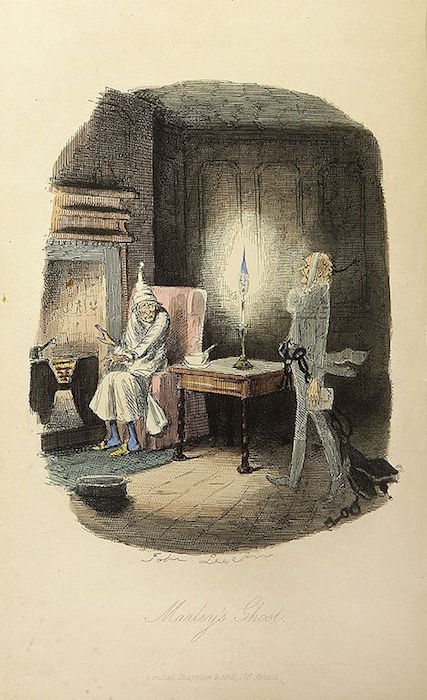
Marley’s ghost, from Charles Dickens: A Christmas Carol. In Prose. Being a Ghost Story of Christmas. With Illustrations by John Leech. London: Chapman & Hall, 1843. First edition. Courtesy Wikipedia Commons.
More employers instead tie cash gifts to worker performance
Scrooge is alive and well and working in the business world. According to a recent study by Hewitt Associates, the Grinch will quash the “visions of bonuses” in many workers’ heads this year, with nearly two-thirds (65 percent) of U.S. organizations saying they would not offer holiday bonuses.
For people who used to count on a little extra cash around the holidays, this serves as yet another reminder of how much the traditional relationship between workers and employers has changed. A generation ago, many business owners were likely to consider workers part of the family and gave them gifts of certain rewards around holiday time. Nowadays, rewards have been replaced by the idea that employee bonuses should reflect productivity and profits, said Roger Herman, a workplace consultant and futurist. “It’s a cultural shift,” he said.
The number of companies offering variable pay or pay-for-performance plans has increased from 51 percent in 1991 to nearly 80 percent in 2003, according to Hewitt’s data. With companies placing greater emphasis on performance, Hewitt’s Ken Abosch is not surprised by the resulting shift in bonus philosophy.
“Companies continue to move away from entitlement awards to awards based on performance,” he said. “In fact, most organizations are seeking a direct connection between performance and awards, and are now focusing on variable pay incentives, which are designed to help employees concentrate on company goals and objectives, while eliminating entitlement issues that often arise with a holiday bonus plan.”
Locally, the Santa Barbara Human Resources Association (SBHRA) found that 45 percent of companies surveyed don’t offer a year-end or holiday bonus/gift, said Jenni-Marie Peterson, citing statistics from a benefits survey conducted in 2002.
While bonuses might be fading into the sunset, the office holiday party tradition endures. Hewitt found that 68 percent of companies plan to host a holiday party this year, with $11,050 as the median amount spent on parties.
